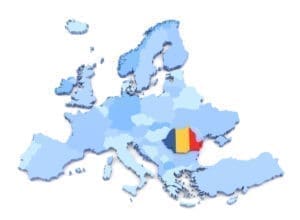Obtaining Romanian Citizenship – The History of Jews in Romania
Romanian citizenship grants a variety of benefits, including the option to study, work, and live in all European Union (EU) countries. This article explains how Jews historically arrived in Romania and lived there over the years. Also, at the end of the article is up-to-date information about the various procedures required for Romanian naturalization.
Our law offices with branches in Tel Aviv and Jerusalem specialize in immigration to Romania. We have been working with the Romanian authorities for years, and have assisted very many Israelis in obtaining/restoring Romanian citizenship. If you or your forefathers have come from Romania in the past, it is likely that you, too, are eligible for a European passport today.
Obtaining Romanian Citizenship – The History of Jews in Romania
This article relates to the experiences of the Jews in Romania from the time they settled there and until the end of Romanian Jewry at the end of World War II. The Jewish community in Romania was significantly large, and numbered almost 800,000 people. Following the tragic results of the Holocaust, a little more than 350,000 people survived. About 100,000 of them chose to come to Israel. Today their descendants number hundreds of thousands of people, the vast majority of whom are eligible for a Romanian passport, with all its advantages.

The Beginning of Romanian Jewry
As deduced from archeological research, the first Jews came to Romanian territory in the late second century AD. This fact has been confirmed by archeological findings in several places in Romania. At the same time, various ancient stone fragments have been found on which are inscribed Hebrew names such as Jacobs, Aba, and Bar-Simsus of Caesarea. In addition, coins have been found that date to the Bar Kokhba revolt, as well as various other traditional tokens.
In ancient Romanian sources, the first mention of Jews on Romanian land is from about 1,000 AD. During this period, according to the Romanian chronicles, Judaized Khazar tribes arrived in Romania to settle there. These tribes settled in the western part of the country, near the Tisza river (also spelled Tysa, or Tisa), and worked mainly as farmers or tradesmen.
An ancient documentation from 800 years ago mentions Karaite Jews who settled in the eastern part of the country. They worked as tradesmen in the vicinity of the Black Sea as they diligently moved from the European side to the Asian side of the sea. This group practiced traditions that were slightly different from the Rabbinic ones.
Prominent Mentions of the Community
Clear landmarks of the Jewish community and its lifestyle date back to the 14th century, due to a large number of refugees from Hungary who were prosecuted for practicing their religion and fled to Romania. They contributed significantly to the development of Romanian Jewish culture. Over the years, Yiddish language, and Ashkenazi traditions that were established over the generations and became a prominent part of Romanian Jewry. Also, the documentation from this period mentions a large group of Polish Christians who had converted to Judaism and then fled to Romania due to prosecution by the church.
From about this time, the Jewish population in Romania began to take form and develop its own unique identity. Yeshivas (Jewish religious scholarship institutions) were established, and Judaism was taught to children throughout the community. However, at this stage, there were no outstanding rabbinical scholars or great Jewish leaders.
The 16th Century – The Community Is Officially Recognized by the Romanian Authorities
A clear increase in the size of the community occurred during the 16th century. The reason for this increase was the immigration to Romania of a large group of Polish Jews together with Jews who were expelled from Spain and who had lived in one or two parts of the Ottoman Empire after the expulsion. These two groups had an immeasurably higher social status than the local residents, especially the Jews from Spain. At the time when they arrived, the “biography” of Romanian Jewry began to be written both at the state level and at the religious level (by the community).
Documentation from this period in Romania includes responsa literature, headstone inscriptions, official counts of the Jews by the Romanian authorities, business transactions, and lifestyle descriptions. At the same time, the Jewish ghetto developed, which encompassed a vast area. It was called the shtetl (or shtetel), which is a diminutive of shtot – the Yiddish word for a city – and means “little town.”
Social Integration in the Romanian Economy – Obtaining Romanian Citizenship – The History of Jews in Romania
At the end of the 16th century, Romania was a bustling place of international business, due to its location between two giant empires who signed a mutual trade agreement. These two empires were the Ottoman Empire and the Polish–Lithuanian Commonwealth. At the time, they were leading forces in the international arena and bridged between Europe and Asia, which was rich in natural resources.
Romania stood right on the border between the two, and its Jews used this to their advantage and worked in trade, at which they often excelled. Among other occupations, they also worked as diplomats, assistants, pharmacists, and general craftsmen such as glaziers, blacksmiths, and dyers.
They began to rapidly increase in number again due to the murderous Cossack riots that took place in the northern part of the country, in the buffer zone between Romania and Ukraine, as part of the Khmelnytsky Uprising (also known as the Cossack-Polish War, the Chmielnicki Uprising, the Khmelnytsky massacre or the Khmelnytsky insurrection). The reason for this massacre was political revenge between the different kingdoms, which led to mutual mass murder. Thousands, and maybe hundreds of thousands, fled for their lives into Romania.
The Jewish Mode of Life in Romania, Over the Years
The Jewish lifestyle in Romania was mostly isolated and detached. It would be reasonable to say that a considerable portion of the Jews there never met a non-Jew in their lives, since they lived inside the shtetl and rarely left it, for fear of antisemitism and vandalistic riots that were common in Europe due to deliberate incitement by the Christian establishment.
This dire situation led to centuries of living in a closed poor community. Poverty in medieval Romania was considerable, and the Jews preferred to live in a kind of closed space of their own, where they practiced their religion and maintained their separation from the outside world, which made their lives even more difficult. Poverty was considered by them to be a symbol of devotion to Torah and to G-d, so they rarely complained about it.
Kabbalah Reaches the Shtetl
One way of dealing with the situation, which untied the Jewish people even in times of trouble and provided them with explanations for what they were going through, was studying the Kabbalah (a school of thought in Jewish mysticism). The structure of the sefirot (emanations), and the understanding of Jewish mysticism, gave them an eternal answer to the hardships of the Jews throughout the period of exile from the land of Israel. Therefore, the followers of Kabbalah in Romania took it upon themselves to deeply study the Kabbalic texts. This custom became even more pronounced when Hasidic Judaism was established by the Baal Shem Tov, after the Cossack riots that took place during the Khmelnytsky Uprising.
The Jewish scholars in Romania continually recited the Zohar, and the writings of Rabbi Hayyim Vital were read over and over again in batei midrash (Jewish Houses of Learning) in Romania. Many books were written about the freedom that awaited the Jewish people from the harassment against them by non-Jews. According to the Jews in Romania, studying the Zohar was the main clear way to understand G-d’s moves in the world and the ways of His leadership.
Romanian Jews in the Modern Era
The Jews living in Romania at the end of the 18th century numbered between 40,000 and 45,000. From that period forward, the Jewish population grew exponentially, and, over 250 years, it multiplied by 20. This increase occurred because of the development of the field of medicine in Eastern Europe, but also because of the mass immigration from Russia, Hungary, and Ukraine.
Although antisemitism in eastern Europe was legal throughout the 18the, 19th, and even 20th centuries, this did not prevent Jews from entering the local work and business market. In fact, they became impressively integrated in the local economy and social life. This is evident from the following data:
At the beginning of the 20th century, 20% of all Romanian tradesmen were Jews. Almost 40% of them were doctors. Many bank branches were managed by distinguished Jewish families such as the Asher, Bally, Halfon, and Elias families. Jews were also prominent in the fields of acting, law, entrepreneurship, and more.
However, because of the jealousy and social hostility that often led to violent anti-Semitic outbursts, tens of thousands of Jews chose to leave the country and immigrate to the west of the continent or to the New World, where they enjoyed the support of the authorities and equality of civil rights.
Advantages of a Romanian Passport
A Romanian passport grants special benefits since Romania is a full member of the European Union. From the moment that you become an EU citizen, you will be allowed to work, study, and live in any of the EU countries, which include attractive developed countries such as Germany, Austria, Italy, Holland, and France.
Very soon, probably around the years 2023/2024, Romania will join the list of countries whose citizens are exempt from obtaining a visa if they wish to travel to the USA. Romanian citizens will be able to visit the USA freely. If you plan to visit beautiful Europe, a European passport will grant you free travel between the various states that are signatories to the Schengen acquis, which includes all the countries in Western and Central Europe. You will also be able to enjoy advanced medical services at a local price in advanced Western European countries.
Documents Required When Applying for Romanian Citizenship
- A photo ID
- A copy of the applicant’s marriage certificate (if they are married)
- A Police Clearance Certificate (PCC) / Good Conduct Certificate
- An official document that proves the past Romanian citizen’s connection to Romania (certificate of birth/marriage/divorce/citizenship record)
- Other documents may change on a case by case basis, but will always include original birth records and original citizenship records, which we can sometimes help obtain.
The documents must be translated into the Romanian language and authenticated by a notary public.
How Long Does It Take to Get Romanian Citizenship?
The average time that the process takes is between two and four years, depending on the proofs that the client presents. However, it often happens that old documents of a past Romanian citizen are lost or can no longer be found. When this is the case, the original documents must be searched for in the Romanian archives. This lengthens the process by several months, and probably involves additional cost.
How Much Does It Cost to Obtain Romanian Citizenship?
The cost of the process is not so high for such a solid future investment as receiving a quality European passport. However, it often depends on the nature of the documents that exist and the individual process of each applicant. In certain cases, there is a need for comprehensive examination with the Romanian authorities concerning the question of whether the applicant’s parent/grandparent/etc. was actually a Romanian citizen. Take note that, if several family members apply as a group, this will considerably reduce costs.
Contact Our Law Offices, Which Specialize in Immigration to Romania, to Issue a Romanian Passport
Eligibility to Romanian citizenship at our law offices – our branches in Tel Aviv and Jerusalem have a skilled staff who work around the clock with the Romanian authorities that are in charge of approving applications. Since Romania has joined the European Union, it has become an attractive destination for many Israelis. If you, too, have a distant connection to the country, you are probably entitled by law to receive citizenship.
For our comprehensive article about obtaining Romanian citizenship, click here.
מאמרים מומלצים

